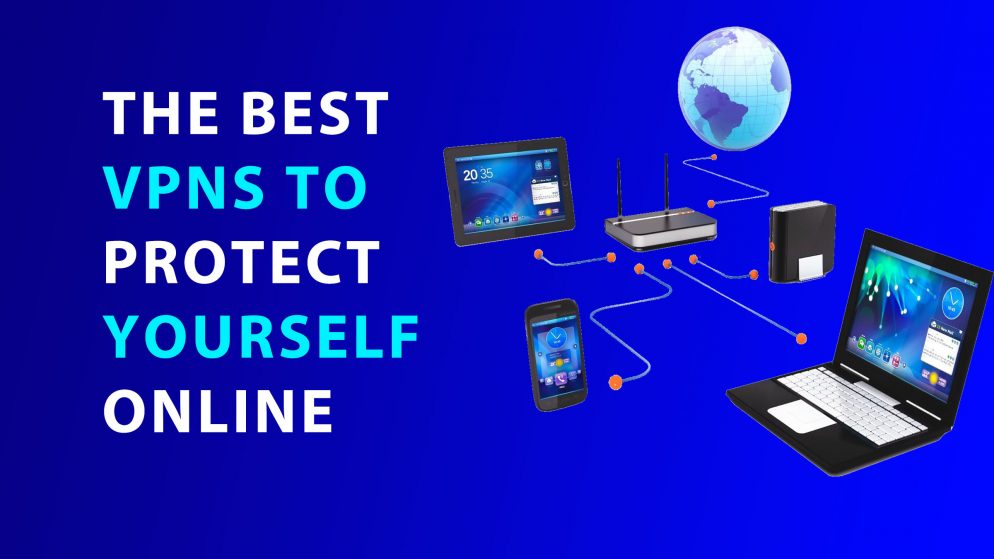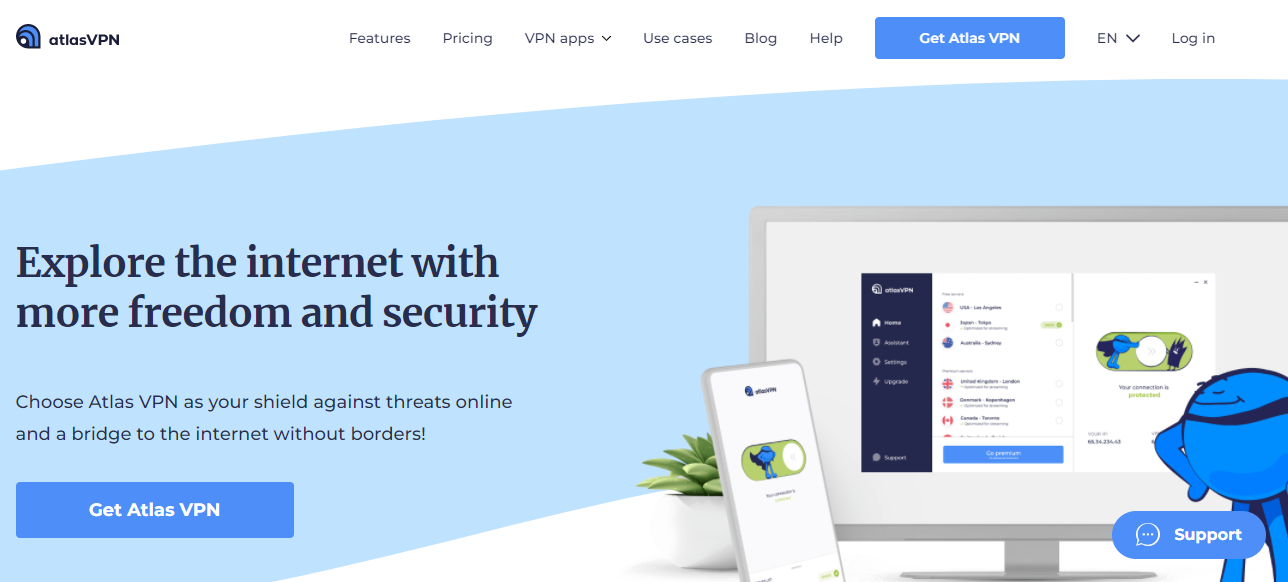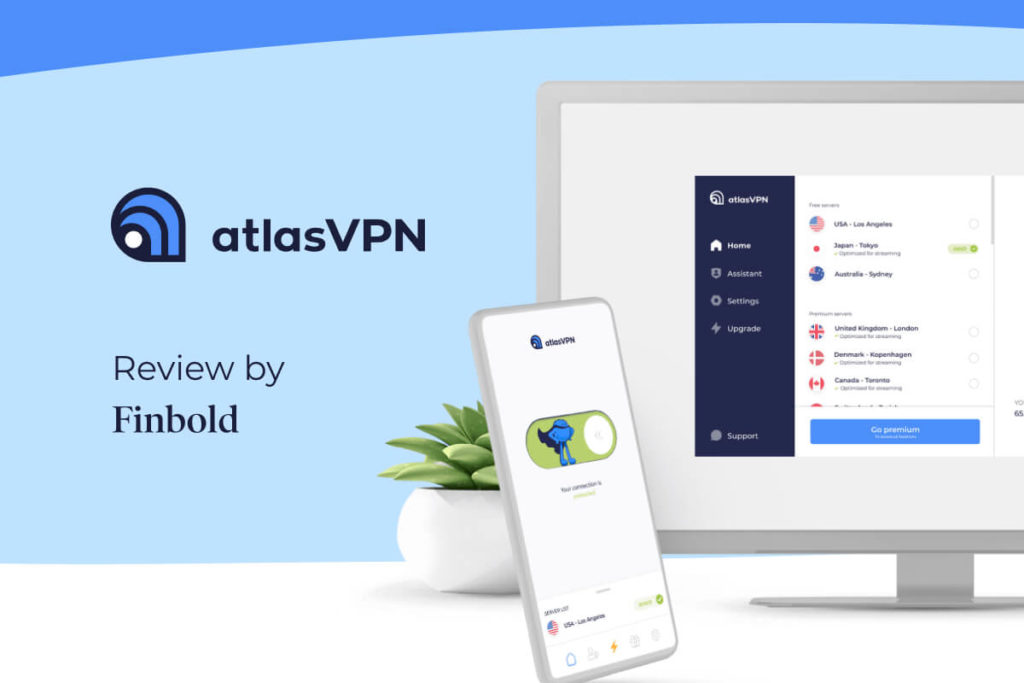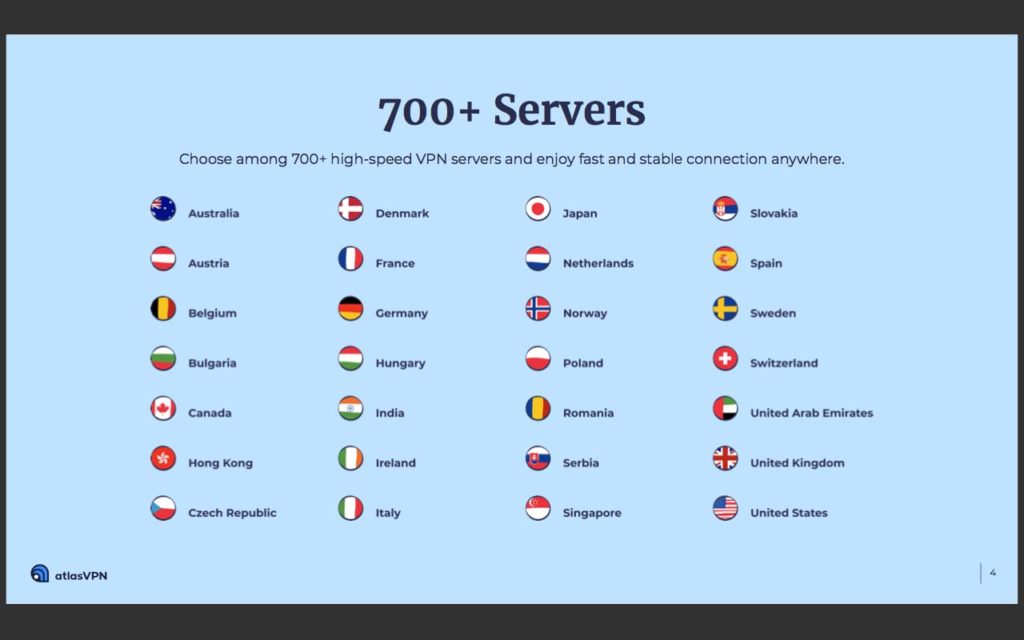

About Atlas VPN

Founded in 2019, Atlas VPN is a highly secure freemium VPN service with a goal to make safe and open internet accessible for everyone. In 2021, Atlas VPN became part of Nord Security — a leader in providing digital security and privacy solutions. While relatively new to the VPN scene, we are already trusted by more than 6 million users across the world.
Our main driving force is to make digital privacy and security accessible to all consumers, irrespective of their budget or tech-savviness. Anyone is welcome to try Atlas VPN for free or sign up for premium services with more additional features. Regardless of your decision, we will fully support your journey to privacy.
At Atlas VPN, we are committed to staying at the forefront of cybersecurity. Every day we strive to create innovative cybersecurity solutions that would improve the digital lives of people around the world. Meet the team behind our product.
Atlas VPN offers a decent set of privacy features in addition to basic VPN functionality that, on paper, is comparable to the best VPNs on the market. Unlimited simultaneous connections for paying users and a high data cap for free users make it especially attractive. Some design quirks and unusual behavior in hands-on testing marred our experience, though, and we’d prefer the company undergo a third-party audit of its policies and infrastructure. Atlas was recently purchased by the parent company of Editors’ Choice winner NordVPN, from which we hope Atlas takes some tips to improve its offering.
Atlas VPN pros and cons

Pros:
- Works great with streaming services
- Strong security
- Unlimited simultaneous connections
- No identifying logs
- Fast speeds
Cons:
- Privacy policy could be more explicit
- Poor customer service
- Doesn’t work in China
- Doesn’t accept cryptocurrency
- No support for routers, Linux, or Fire TV
- Missing some useful features like split tunneling
Atlas VPN offers software for smartphones, tablets, and desktop devices, supporting Android, iOS, macOS, and Windows. They’ve also recently launched software for Android TV and Amazon Fire TV.
However, their software currently doesn’t work on Linux, and some of their features and options aren’t available on desktop.
In terms of user data, Atlas VPN does log some basic user information. This is basic user data required for the application to function properly. Atlas VPN claims they aren’t able to identify the user or their IP address while connected to the servers.
How Much Does Atlas VPN Cost?

Atlas VPN costs $10.99 per month, over a dollar more than the $9.93 average we’ve seen across the VPNs we’ve reviewed. Several excellent VPNs offer prices far below the average: Editors’ Choice winner Mullvad VPN, for instance, costs just 5 euros per month ($5.57 as of this writing).
Nearly all VPNs offer steep discounts if you sign up for long-term subscriptions. Atlas VPN’s price drops to $27.40 for the first year of an annual subscription, and $71.49 for three years. Both the annual and three-year subscription automatically renew at $47.83 per year once the initial term ends. Extra discounts with a price increase are common in the world of antivirus and are becoming more common among VPNs. We find the practice confusing and believe most consumers would not expect the price hike. Ivacy VPN and Kaspersky Secure Connection have the cheapest annual plans we’ve seen, at just $29.99 per year.
While you will save money on a long-term subscription, we advise against starting out with one. Instead, sign up for the shortest subscription available so that you can test the VPN in your own home. Extra money up front is better than being stuck with a disappointing product for a year or more.
Atlas VPN is one of the very few VPNs to offer a full-fledged free subscription. While all reputable free VPNs have some limitations, Atlas VPN’s are quite generous. Free subscribers have unlimited bandwidth and access to three VPN server locations—Amsterdam, Los Angeles, and New York—and are allotted two simultaneous connections. Atlas VPN does limit the total amount of data free users can consume, capping Windows users at 10 GB per month and Android, iOS, and macOS users at 2 GB per day. That’s much more data than Editors’ Choice winner TunnelBear VPN, which caps users at a mere 500MB per month, but less than Hotspot Shield VPN, which caps users at 5 GB per day. Editors’ Choice winner ProtonVPN is our pick for free VPNs since it places no data limit on its free subscribers and offers affordable pricing tiers.
You can purchase an Atlas VPN subscription with a major credit card, Google Pay, or PayPal. It does not currently support cash or cryptocurrency purchases. Editors’ Choice winners IVPN and Mullvad VPN accept anonymous cash payments sent to their respective HQs and also use a privacy-protecting semi-anonymous account system.
What Do You Get For Your Money With Atlas VPN?

The basic function of a VPN is to create an encrypted connection between your machine and a server operated by the VPN company. All your internet traffic passes through the connection to the server and then returns to the internet as normal. This ensures that your ISP can’t monitor, or profit from, your online activities. It also makes it harder for advertisers and others to track your movements across the web.
Most VPNs place a limit on the number of devices that can connect to the VPN service at once. Usually, the limit is five devices per account. That’s changing, however. Atlas VPN is among a new class of VPN services that place no restrictions on the number of simultaneous connections, which includes Avira Phantom VPN, IPVanish VPN, Editors’ Choice winner Surfshark VPN, and Windscribe VPN.
Split tunneling is a convenience feature included by most of the best VPNs. When enabled, it routes the traffic of specific apps outside the VPN’s encrypted connection. It’s handy for high-bandwidth but low-security activities, such as video streaming and gaming. Atlas VPN does include this feature, but only in its Android app.
The best VPN services let users enhance the privacy of their connections with multi-hop connections. This routes your VPN traffic through a second VPN server, making it harder for your traffic to be tracked even if one of the VPN servers is compromised. Atlas VPN does include multi-hop connections, but we found the execution lackluster (as you will see).
Still others provide access to the free Tor anonymization network via VPN, for even more anonymization. Tor is free to use, but significantly cuts into internet speeds—especially when a VPN is involved. Editors’ Choice winners NordVPN and ProtonVPN are among the very few VPN companies to offer both of these features.
Many VPNs claim to block ads and trackers, but Atlas VPN is one of the few services that tries to show its work. Like Norton Secure VPN, Atlas VPN shows a running tally of the ads and trackers it has blocked. We do not test the efficacy of ad-blocking in VPNs.
A subset of Atlas VPN’s servers are called SafeSwap servers. Atlas VPN tells us that these have a pool of IP addresses assigned to them, and they cycle through them periodically. The idea is that changing your IP address frequently helps make you harder to track online. We’ve not seen this feature before, the only comparable option being the IP Shuffle option in HMA VPN.
Atlas VPN also includes a Data Breach Monitor. Simply enter an email address and Atlas VPN will inform you if that address appears in a collection of breached credentials. It’s similar to the popular HaveIBeenPwned site. Free users can track a single address, while paying customers can track any number of addresses. A representative for Atlas VPN told us that emails used for data breach monitoring are not sent via plaintext and are only used for data breach monitoring, and not marketing or sales activity. The company has not released a final list of vendors for its monitoring service.
VPNs are useful privacy tools, but they don’t protect against every threat. We highly recommend using standalone antivirus software to protect your machine, enabling multi-factor authentication wherever it’s available, and using a password manager to create unique and complex passwords for each site and service you use.
What VPN Protocols Does Atlas VPN Support?

VPNs have been around a long time, and there are several methods for creating a VPN connection. We’ve long preferred OpenVPN, an open-source option that has been picked over for potential vulnerabilities. A new open-source protocol, WireGuard, uses newer technology and we expect it to soon become the standard among VPN companies.
Atlas VPN supports WireGuard and the excellent IKEv2 protocol on all its apps. It does not support OpenVPN.
Atlas VPN Servers and Server Locations

We prefer VPN services that provide numerous and well-distributed VPN servers. Having a nearby server ensures good service, and having a lot of server locations gives you more options for spoofing your location. Atlas VPN offers servers in 31 countries, well below the average of 50 we’ve seen across the VPNs we’ve reviewed. More disappointing is that Atlas VPN’s servers are heavily concentrated in North America and Europe, with no presence in the entirety of South America or Africa. ExpressVPN has servers in 94 countries, with a strong presence across the globe.
Atlas VPN says it has 750 total servers. That’s a tenth the size of CyberGhost’s server fleet, but the number of servers doesn’t necessarily correlate to better service. Atlas VPN says it rents, and does not own, its servers, but pointed out that they fully manage the servers. This is not an unusual arrangement. To protect their servers, companies including ExpressVPN and NordVPN have embraced RAM-only servers, which do not store information to disk and are wiped whenever they are powered off. Atlas VPN says that it relies on fully encrypted disks to protect its servers.
Many VPN services use virtual locations, which are servers configured to appear somewhere other than where they are physically located. This is not necessarily a bad thing, and some companies use virtual locations to provide local coverage to unsafe regions. Such servers should be clearly marked but it’s a nonissue for Atlas VPN as it does not use any virtual locations. All servers are located exactly where they say they are.
Similar to virtual locations are virtual servers, where a single hardware server plays host to multiple software-defined servers. This can include servers from multiple renters on a single server. Atlas VPN tells us it uses only dedicated, hardware servers.
Your Privacy With Atlas VPN

VPNs are in a privileged position and could, if they wished, observe your traffic and sell your data. We interview companies and read their privacy policies to get a sense of what measures VPN providers take to protect your privacy.
The company told us that it does not log “any user activity or any other data.” Any data needed for creating a VPN connection is wiped when customers disconnect. The company’s privacy policy also says that it specifically does not collect IP addresses or user activity. That’s excellent. The company confirmed to us that it does not sell user data and that its only source of revenue is customer subscriptions.
Atlas VPN gathers information on app usage and customer devices, such as device model and OS version. The company also says it uses ad identifiers. Ad identifiers are IDs assigned by app stores to mobile devices. You can reset your ad ID and all the data from before you did so is useless to since it no longer connects to your ID
The company notes that while it does comply with legal requests for information, “we do not have any data to share with law enforcement and government agencies who make requests for information about what you were doing through a VPN connection.” The company maintains a live warrant canary, which doubles as a kind of transparency report by showing the number of national security letters, gag orders, and warrants it has received. All figures are currently zero. We prefer more in-depth reports that show disclosures over time, but this is a good start.
The location of a company can matter, because depending on local laws, there may be obligations to store customer data. Atlas VPN operates under the legal jurisdiction of the US, which does not have data retention laws. The company explained to us that it has a global, distributed workforce with its physical office located in Lithuania. The company explained to us that Atlas VPN is a trademark of Peakstar Technologies Inc., and is now owned by the Nord Security Group, the owners of NordVPN.
On February 2, 2022, NordVPN and Surfshark VPN announced that the two companies were merging. The two brands would remain separate products, with their own infrastructure. Surfshark VPN and NordVPN will both be owned by a new holding company called Cyberspace, which is registered in the Netherlands. A NordVPN representative explained that because Atlas VPN was acquired by NordVPN directly, it would remain a part of NordVPN’s corporate structure.
The trend among the best VPNs is commissioning third-party audits of their infrastructure and policies to establish their privacy bona fides. To date, Atlas VPN has only commissioned an audit of its iOS app from VerSprite. Audits are imperfect tools, but we appreciate the effort at transparency from VPN companies. NordVPN has undergone several audits over the years, and TunnelBear VPN continues to make good on its promise to release annual third-party audits. Atlas VPN should do the same.
Hands On With Atlas VPN for Windows

We installed the Atlas VPN client on an Intel NUC Kit NUC8i7BEH (Bean Canyon) desktop running the latest version of Windows 10. While installation went smoothly, we were confused about how to actually log in to the service. Both in the app and on the Atlas VPN website, you’re never prompted to enter or even to create a password. Instead, you enter the email address you used when purchasing the service and receive an email with a “magic link” that automatically logs you in.
We’re no strangers to unusual login schemes. One of the best features of both IVPN and Mullvad VPN is that they use a privacy-respecting account system that also does not require a password. Atlas VPN’s approach seems fine, though the company should do a better job explaining how it works.
What really bothered us was that Atlas VPN uses its login system as a constant nag to sign up for its marketing emails. Logging in to the Atlas VPN website, you have to uncheck a pre-checked box to avoid signing up for “exclusive Atlas VPN offers.” In the Windows app, you have to do the same whenever you log in. We’re surprised and disappointed at this aggressive sign up tactic.
Once we logged in, we found the Atlas VPN to be easy to use and understand. Unlike most VPNs, Atlas VPN is built around a list of available servers. These are broken down by region, and some countries open to reveal additional server locations for the country. This appears to give customers access to specific VPN servers, but we’d like to see more information about usage and ping time. Atlas VPN should, for example, introduce a naming system that differentiates between the three servers all labeled New York. The list is not searchable and there’s no included map to fudge a location if you can’t find what you’re looking for. Buttons at the top let you see All severs, Streaming servers, and Privacy Pro, which includes SafeSwap and multi-hop options.
While we were testing Atlas VPN on Windows, we noticed the app received some improved features and visual tweaks, sporting brighter colors and improved interface. We still wish the text were a little larger and the window resizable, but it’s an improvement and bodes well for the future.
An enormous Connect button occupies a full third of the app. We appreciate how easy Atlas VPN makes getting online. When you toggle the connection, the button slides over, pushing a trio of spikey baddies offscreen and revealing the heroic, spherical Atlas VPN mascot. We like these flourishes, and it gives Atlas VPN a little more personality than other services. We still prefer the bright colors and friendly bears found in Editors’ Choice winner TunnelBear VPN, however.

During testing, we noticed an odd quirk with Atlas VPN. Regardless of how many times we selected a different server, the app automatically routed us to Ireland after we restarted it. We experienced a poor connection through the Dublin-based server, and we wonder if other users would have assumed the service simply did not work. Atlas VPN was updated in the middle of our review process, and the issue remained. Performance was significantly better when using a nearby US-based server.
Unique to Atlas VPN are its SafeSwap servers, which automatically rotate your IP address for additional anonymity. We confirmed that our IP changed multiple times while we were connected to the US SafeSwap server.
Atlas VPN takes a slightly different approach to multi-hop servers. Most services let you choose an exit point for your data, or a pre-set path with an entry and exit point listed. Atlas VPN just has two buttons, one labeled Europe and the other North America. We like that multi-hop is included, but find this approach overly vague. IVPN, notably, lets you mix-and-match its server locations to build your own multi-hop connection.
If you have turned on the Atlas VPN Kill Switch, a warning message pops up whenever you manually disconnect the VPN alerting you that the Kill Switch will also be deactivated. We appreciate the transparency about the app’s functionality. We weren’t able to induce an error to test the Kill Switch.
Two of Atlas VPN’s more unusual features are found in the Assistant section of the app. Here you can enroll emails to be monitored for data breaches and see how many trackers Atlas VPN has thwarted. Given the app’s aggressive email gathering techniques, we were wary of giving it more personal information, even if it’s for monitoring against data breaches. We were pleased to see that the Tracker Blocker counter appeared to work correctly, and we noted that the sites we visited did have fewer ads—although we do not formally test the efficacy of VPN tracker blocking.
Streaming services block access from VPNs in order to enforce regional distribution deals. In our testing (once we convinced Atlas VPN to not use an Irish server), we were able to stream content from Netflix while connected to a US-based server. Note that VPNs and streaming services are in an active arms race, and a VPN that works one day may be blocked the next, and vice versa.
To ensure that a VPN is hiding our IP address and not leaking our DNS information, we run an extended test using the DNSLeakTest.com tool. With Atlas VPN, the test showed that our true IP address was hidden and our DNS information was not leaked. We tested one server; other servers may not be correctly configured.
Speed Test Results

Using a VPN typically reduces your upload and download speeds, as well as increasing latency. To get a sense of that impact, we run the Ookla Speedtest tool 10 times with the VPN running and 10 times without, take the median of both sets, and then find a percent change between the two. This is a useful way to compare VPN performance, but it cannot be taken as a comprehensive evaluation of a VPN’s performance. Which is to say, your mileage may vary. You can read more about our testing, how it changes, and its limitations, in our feature How We Test VPNs.
Due to the ongoing COVID-19 pandemic, we’ve had limited access to the PCMag Labs. We look forward to testing Atlas VPN soon. You can see the latest results from all the VPNs we’ve tested thus far in the chart below.
At PCMag, we don’t place much emphasis on VPN speed. Instead, we advise readers to focus on value, features, and privacy protections.
Atlas Shrugged

Atlas VPN is, in every respect, fine. Just fine. It has most of the features we want to see in a VPN, but the execution needs work. It has a fairly well designed app, but the service needs to give users more information and control. It uses a nifty password-less login system but is also irritatingly pushy about email signups in the process. A true mixed bag.
Where Atlas VPN excels is with its free subscription and its unlimited simultaneous connections. Free subscribers are limited to just three servers, but they get a very generous daily data cap. It seems likely to us that its freemium model is why NordVPN, which shut down its own free trial, picked up the company.
Though Atlas VPN offers a strong free option, but among our Editors’ Choice winners you can find much better when upgrading to a paid service. ProtonVPN has flexible pricing and a free subscription without any data cap. Mullvad VPN and IVPN accept cash payments and feature a privacy-protecting account system. Surfshark VPN also has unlimited simultaneous connections, but brings more features to the table. Finally, TunnelBear VPN may not have as generous a free subscription, but its friendly interface makes it an excellent choice for first-time buyers.
Protocols

Atlas VPN uses AES-256 bit encryption, which provides military-grade encryption. They also use SSL/TLS encryption for data transfers. Atlas VPN has IP leak protection (for both IPv4 and IPv6 connections), DNS leak protection, and WebRTC leak protection.
Atlas VPN uses Wireguard and IPSec/IKEv2 as its VPN protocols. These are both high-grade encryption protocols, and their adoption also shows a lot of promise from Atlas VPN.
Recently, AtlasVPN had its first security audit, which was generally positive. It revealed two medium-level threats that affected the Atlas VPN backend service, and three low-level threats affecting the iOS app. However, the identified threats were dealt with swiftly by AtlasVPN.
AtlasVPN also offers a Data Breach Monitor that continuously monitors whether there has been a data breach on users’ email addresses.
Logging and privacy

Without a proper logging policy, a provider can see everything you do online. In such cases, you don’t have guaranteed anonymity and online protection. Atlas VPN does not log the internet usage of individual users. They have a “no logging” policy.
However, this doesn’t mean that they don’t log anything at all. In fact, Atlas VPN logs data that can help it improve its services, provide premium features to users as well as communication data, such as your email address. The list below gives other examples of data collected about you when you use their apps:
Data about the app’s use: including the changes you make to your settings and the date and time at which you connect and disconnect.
Data on your device: what type of device you use, including information about its make, model, language, operating system, time zone, and location (city scale).
Your device ID: whether Atlas VPN is referring to your device’s MAC address isn’t completely clear from their privacy policy. They use so-called “advertising IDs” for marketing purposes.
Atlas VPN is based in the US, which is a “5 Eyes” country. However, their logging policy claims they don’t log any browsing data to hand over to governments or law enforcement.
Customer service

Atlas VPN’s customer service can be contacted via email. If you click on the “Help” section on their site, you’ll find a series of frequently asked questions and support articles. Below that, there’s a button to contact their customer support agents. The average response time for support queries is 24 hours, so it’s not ideal if you have a pressing issue. On top of that, there’s no live chat support.
Conclusion – Our Experience with Atlas VPN

Atlas VPN is a new VPN on the market and offers a service that’s free. They also have a premium service with added features. The software is easy to install and very user-friendly. Moreover, the service is quite fast during daily use. Finally, the premium version of this service will give you access to the American version of Netflix.
The biggest drawbacks of this VPN are its logging policy, customer support, and server network. They claim they don’t log any information about you, but their policy shows they state that they save various kinds of user data. The customer support is also pretty limited and accessible only via email.
Atlas VPN is a new VPN provider that is constantly working on improving its service. Chances are, it’ll grow to become an (even) better service in the future.
Frequently asked questions Atlas VPN

How does a VPN hide my real location?
A VPN can hide your location by masking your IP address. All you need to do is connect to one of our VPN servers. Then, we create an encrypted connection (tunnel) between your device and the internet. Your original IP address gets replaced with our IP address, identifying the location you have chosen. Since you share it with dozens of other connected users, you get to blend into the crowd. As a result, it becomes more difficult to identify or trace your online actions back to you.
Are VPNs legal?
In the majority of countries, VPNs are perfectly legal. Many users, companies, and even governments use it to protect their data. However, there are certain exceptions when laws do prohibit the use of VPNs. You are welcome to check whether your country has any limits or rules governing these applications. Please bear in mind that illegal activities still constitute criminal behavior, regardless of whether you have a VPN or not. We encourage you to use our VPN safely and in accordance with the legal provisions.
Isn’t a proxy service good enough?
A reliable proxy service will do its job in changing your IP address. However, most of them do not offer any additional protection. It means that a proxy service probably won’t encrypt your traffic nor offer other security measures. Some free proxies can even be dangerous, so be extremely careful before connecting to one. Furthermore, proxies work on the application level, meaning that they will reroute traffic of a specific app or browser. VPNs work on the OS level and forward all traffic from and to your device.
Should I use a VPN all the time?
Yes, it is recommended that you keep a VPN active at all times. Only then can you keep your browsing habits and IP address hidden from intrusive snoopers. To the very least, connect to VPN servers when you:
- Use public Wi-Fi
- Travel abroad
- Send sensitive data
- Perform financial transactions
- Want to access content unavailable in your country
- Visit HTTP websites
- Want to stay private and safe online
Do I need a VPN at home?
A VPN will keep you protected regardless of your location. At home, you are likely to engage in various activities. From shopping online or making financial transactions to regular browsing, a VPN ensures that all these actions happen as safely as possible. The main benefits of using a VPN at home are the following:
You get to hide your browsing activities from your ISP. In many countries, these providers can sell information on their clients’ browsing habits.



